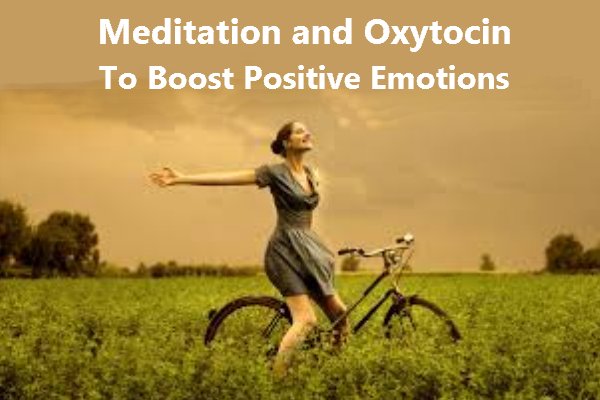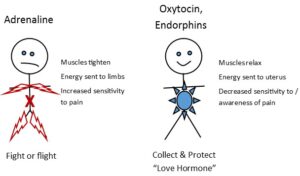 Meditation and oxytocin hormone are linked with positive emotions. Meditation generates oxytocin hormone and the oxytocin generates positive emotions. Emotional warmth associated with loving kindness meditation (LKM) produces the hormone, oxytocin. The most common positive emotions as joy, gratitude, serenity, interest, hope, pride, amusement, inspiration, awe and love.
Meditation and oxytocin hormone are linked with positive emotions. Meditation generates oxytocin hormone and the oxytocin generates positive emotions. Emotional warmth associated with loving kindness meditation (LKM) produces the hormone, oxytocin. The most common positive emotions as joy, gratitude, serenity, interest, hope, pride, amusement, inspiration, awe and love.
What is Oxytocin?
 Generally, oxytocin is a hormone produced by the hypothalamus and secreted by the pituitary gland, a pea-sized structure at the base of the brain. It is oxytocin that triggers the bond between a mother and an infant, and it is also play a role in recognition, relationship, trust and anxiety. Levels of this hormone tend to be higher during both stressful and socially bonding experiences. Recently, oxytocin has been suggested to be an important player in social behaviour. The production of oxytocin is controlled by a positive feedback mechanism. This mechanism allows the release of the oxytocin hormone when a trigger occurs. Humans who generates oxytocin more scored higher in trust. Low oxytocin levels have been linked to autism and autistic spectrum disorders.
Generally, oxytocin is a hormone produced by the hypothalamus and secreted by the pituitary gland, a pea-sized structure at the base of the brain. It is oxytocin that triggers the bond between a mother and an infant, and it is also play a role in recognition, relationship, trust and anxiety. Levels of this hormone tend to be higher during both stressful and socially bonding experiences. Recently, oxytocin has been suggested to be an important player in social behaviour. The production of oxytocin is controlled by a positive feedback mechanism. This mechanism allows the release of the oxytocin hormone when a trigger occurs. Humans who generates oxytocin more scored higher in trust. Low oxytocin levels have been linked to autism and autistic spectrum disorders.
Meditation and Oxytocin
 Meditation widen people’s outlooks in ways that, little by little, reshape who they are. The expansion of “Who Am I” emotion in meditation momentarily broaden people’s attention and thinking, enabling them to draw on higher-level connections and a wider-than-usual range of percepts, ideas and positive emotions. People who experience frequent positive emotions have even been shown to live longer. Brain oxytocin also reduces stress responses, including anxiety. Meditation, then, offers opportunities for enhanced emotions throughout the day, not simply during meditations. Regular meditators showed a trend toward increased telomerase activity. Like other meditation practices, LKM involves quiet contemplation in a seated posture, often with eyes closed and an initial focus on the breath. LKM involves a range of thoughts and visualizations, and it directly evokes only select positive emotions (i.e., love, contentment, and compassion).
Meditation widen people’s outlooks in ways that, little by little, reshape who they are. The expansion of “Who Am I” emotion in meditation momentarily broaden people’s attention and thinking, enabling them to draw on higher-level connections and a wider-than-usual range of percepts, ideas and positive emotions. People who experience frequent positive emotions have even been shown to live longer. Brain oxytocin also reduces stress responses, including anxiety. Meditation, then, offers opportunities for enhanced emotions throughout the day, not simply during meditations. Regular meditators showed a trend toward increased telomerase activity. Like other meditation practices, LKM involves quiet contemplation in a seated posture, often with eyes closed and an initial focus on the breath. LKM involves a range of thoughts and visualizations, and it directly evokes only select positive emotions (i.e., love, contentment, and compassion).
Meditation Oxytocin and Stress
Oxytocin hormone generates “tend and befriend” response, as opposed to the “fight or flight” response. Oxytocin can induce anti-stress-like effects such as reduction of blood pressure and cortisol levels. It increases pain thresholds and healing. Stressors are abound in modern life, from workloads, social strain, to just getting out and to somewhere. Everything causes stress, work, social lives, kids, roads, whatever. Meditation is the proven way to reduce stress through oxytocin. Meditation produces success, health, and longevity. Meditation, then, offers opportunities for enhanced emotions throughout the life, not simply during meditations.
References:
1. Effects of oxytocin administration on spirituality and emotional responses to meditation
3. Meditation and vacation effects have an impact on disease-associated molecular phenotypes
4. Yoga The Science of Well-Being By Amit Ray